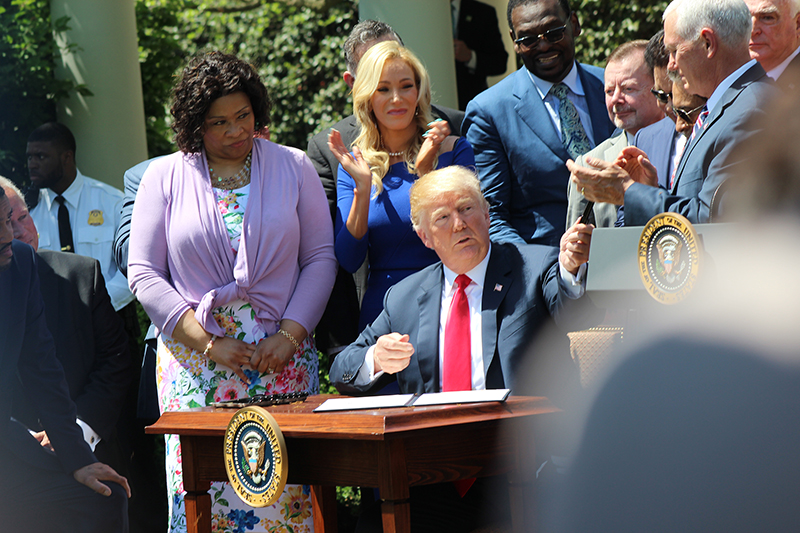(RNS) — On May 3, 2018, a National Day of Prayer, President Donald Trump convened a Rose Garden photo-op to sign an executive order instituting the White House Faith and Opportunity Initiative. This was the belated Trumpian iteration of the White House Office of Faith-based and Community Initiatives created by George W. Bush in 2001 and recreated by Barack Obama as the Office of Faith-Based and Neighborhood Partnerships in 2009.
But where the Bush and Obama offices had identifiable staff members and visible activities, Trump’s appeared to be merely a Potemkin exercise in advertising his devotion to religious liberty. It took another year and a half for the White House to announce that Trump favorite Paula White, a Florida televangelist, would be leading the Initiative as its “adviser.”
Behind the facade, however, was a serious effort to deregulate.
Trump’s executive order tipped it off by striking a subsection of a 2010 Obama executive order that required faith-based social service providers who receive federal funds to refer potential clients who objected to their religious character to an alternative provider — a Christian who doesn’t want to go to a Hindu food pantry adorned with images of Ganesh and Lakshmi, for instance, or a Jew who doesn’t want to go to a church homeless shelter where he’s asked to participate in a Bible study.
RELATED: Biden signs executive order reestablishing White House faith office
It took until April 2016 for the regulatory process to be completed and the Obama rule put in place. The inverse process to undo it under Trump, undertaken by nine agencies, from the Department of Agriculture to the Department of Veterans Affairs, also took two and a half years. On December 17, the outgoing administration published its deregulatory rule, which went into effect January 19, the day before Trump left office.
Where the Obama rule was designed to protect the religious liberty of beneficiaries, the new rule seeks to “protect the religious liberty of faith-based organizations.” It repeatedly dismisses the concerns of beneficiaries as “hypothetical.” Requiring federally funded faith-based organizations to provide notice of, and referral to, alternative providers is deemed unconstitutional compelled speech.
On January 19, a group of liberal advocacy groups and faith-based providers filed a lawsuit in the Southern District of New York to overturn the 2020 rule. The plaintiffs, who include MAZON: A Jewish Response To Hunger, several LGBT and atheist organizations, and the Hindu American Foundation, cite a wide range of non-hypothetical examples of beneficiaries being subjected to discriminatory religious behavior and messaging by faith-based social service providers.
Fast forward to last week, when President Biden signed an executive order nixing Trump’s executive order and reestablishing Obama’s Office of Faith-based and Neighborhood Partnerships. To run it, Biden put in charge Melissa Rogers, the lawyer who ran the office during Obama’s second term. An old-time Baptist devoted to church-state separation, Rogers was more responsible than anyone for the 2016 rule.
So now everything reverts to that rule, right? Not so fast.
“This executive order, like Trump’s, is a signal of a different direction,” said Jennifer Pizer, law and policy director for Lambda Legal, which is helping to represent the plaintiffs. “It’s an important statement but it doesn’t get all the work done.”
Getting all the work done means that, unless the federal court invalidates the Trump rule, the agencies that undid the Obama rule must now go through a process of re-regulation. Thus far, there has been no statement from the Biden administration that they will.
RELATED: Biden signals willingness to dialogue with bishops and other faith leaders
Assuming they do, it shouldn’t have to take the ridiculous six years it took the Obama administration to put its rule in place. Nor should it take the 30 months the Trump administration took to undo it. Given the pending lawsuit, I’d advise half a year, tops.
The Establishment Clause forbids government from pushing Americans toward particular religious practices or identification. However you judge the legitimacy, wisdom or efficacy of faith-based social service provision, a federally funded faith-based provider should at minimum be required to notify and refer to an alternative provider anyone who has a religious objection to receiving its services.
What else is the constitutional guarantee of religious liberty for?






